
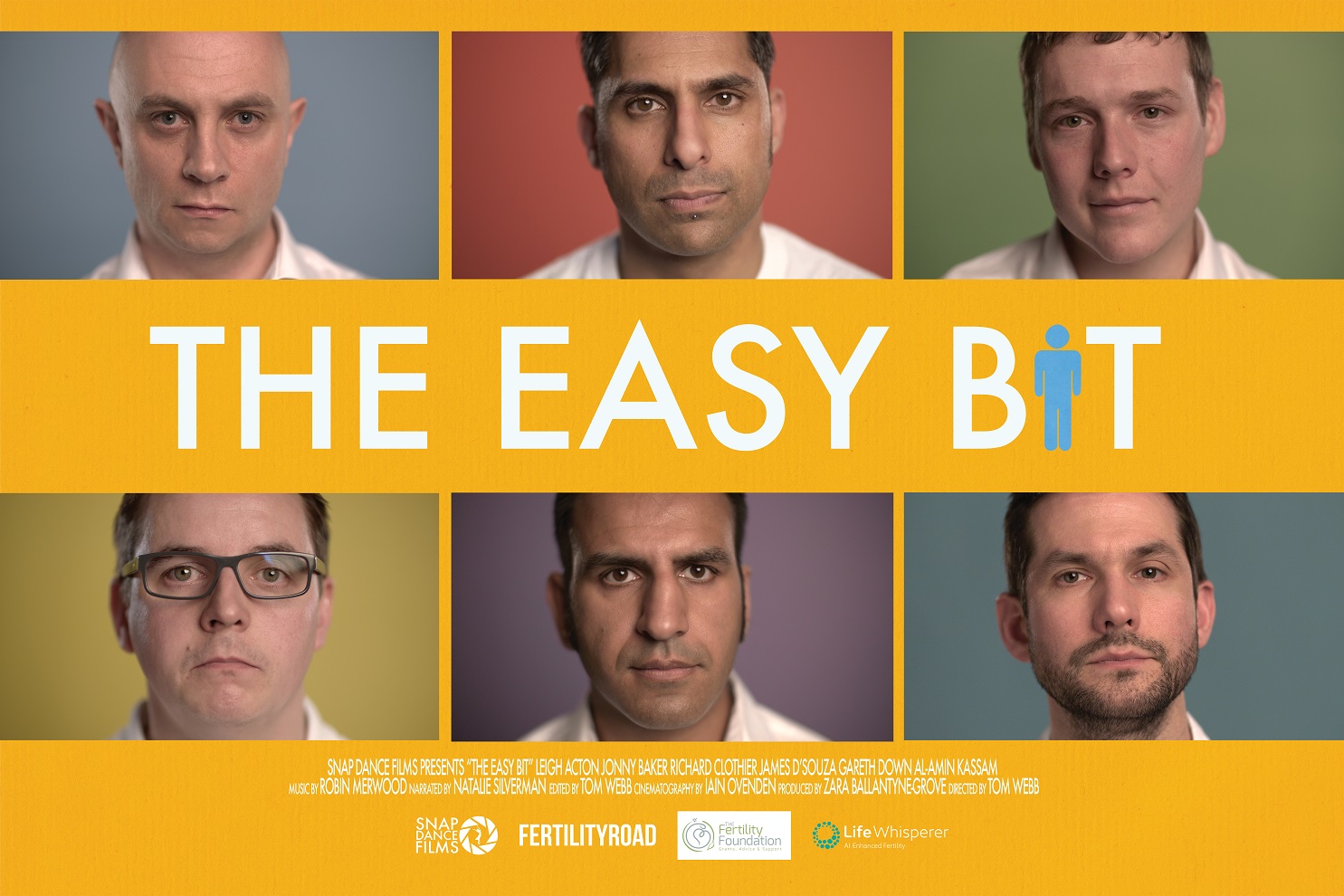
At A Glance
Director Tom Webb shines a light on the sensitive subject of infertility and the often isolating, emasculating journey of In Vitro Fertilisation (IVF) treatment.

Film Details
Cast
Richard Clothier as himself
Leigh Acton as himself
Gareth Down as himself
Al-Amin Kassam as himself
James D’Souza as himself
Jonny Baker as himself
When it comes to IVF, there's no such thing as the easy bit, Tom Webb Explains
By Claire Bueno
‘Am I really a man because I haven’t had children yet?’ James D’Souza poses the question, in this enlightening documentary about infertility The Easy Bit.
There is no disputing that for a woman embarking on fertility treatment in the form of Assisted Reproductive Technology (A.R.T) takes a tremendous emotional and physical toll in order to bear a child. But, with as many as one in six couples affected by infertility in the UK, have we ever paid thought or attention to the male role in this process?
The Easy Bit charts the story of Richard Clothier, Leigh Acton, Gareth Down, Al-Amin Kassam, James D’Souza and Jonny Baker who bravely share their deeply personal journey through In Vitro Fertilisation (IVF) treatment.
Director Tom Webb has used his own experience to encourage discussion, and to provide a voice to a sensitive subject should not be suffered alone.
The first and obvious question, what inspired you to want to make The Easy Bit?
My wife and I were unfortunate enough to experience our own infertility journey. We wrote a blog together charting our treatment which was intended for friends and family but ultimately was read by a much larger audience than expected. I was taken aback at how many people were not only surprised by what I was writing but by the fact I was writing it at all. There was so little information around about the male experience it made me realise that the lack of understanding was far greater than I had realised.
Having been through process personally, you have first-hand knowledge just how little material is out there on the subject of infertility from a male perspective, what made documentary the medium for you?
My career is in video production and filmmaking and I have always wanted to make feature length films, both narrative and documentary. I had been toying with a few ideas for a debut documentary but ultimately this was the film I had to make. At the time I made the decision to make the film my wife and I were at the lowest point of our journey. We thought we would never have children and I couldn’t stand the thought of going through 12 years of pain without something positive to show for it at the end. Ultimately we were lucky enough to have a daughter but I know all too well that not everyone gets their dream. It was clear to me that regardless of how my journey ended I needed to do something to help other guys going through the same experience. It is quite rare to see men talking about subjects like this and I felt that other men would really benefit from guys talking directly to them.
The film is told in chapters, the arc of the story follows the literal and emotional journey of the whole IVF process, was that how you always had structured it?
Fertility treatment is a complex and somewhat chaotic process but despite that it has a very linear structure. I felt that it would help the audience to keep track of all six stories by giving the film a single arc. I also wanted to explain the clinical process as many people may not know what is actually involved. When you are going through treatment you constantly feel like making it to the next stage of treatment is all you need to do and everything will be ok. The chapters in the film reflect those stages and any couple going through treatment will know that each one affects you in a different way, your life becomes dominated by the specific part of the process you are in. A prime example is the two week wait. It is the period between having embryos placed into the womb and taking a pregnancy test to see if treatment has worked. It is this all-consuming limbo filled with hope, anxiety and desperation. Each chapter is in reality its own unique emotional journey.
How did you begin to source your contributors?
Finding men to talk was really hard. It was almost a year into pre-production before we found any and then luck played its part. A lady called Kelly Da Silva, who runs an organisation of women who are childless not by choice, introduced me to The Fertility Network who were looking for someone to film a series of videos for a campaign called Hidden Faces. Every time I filmed a man I asked if they would like to take part in the documentary. Four of the guys came from that campaign and the other two came via those initial four. I was very adamant that there are a variety of stories told so we could talk about as many of the variations in diagnosis as possible.
You have six select contributors which allows us to invest in each individual’s story, was that always intentional?
I initially was thinking ten would be a good number but as time went on and we started filming it became very apparent that that would be too many. It was important not only to cover a variety of conditions but also that those men had time to express themselves. I wanted the audience to be able to identify and empathise with the men so stripping it back to six seemed to be the best compromise and one I am ultimately very happy with.
When it came to the interviews did you standardise the questions to help corroborate experiences?
Every couple goes through a fairly similar process for fertility treatment and because of that and the structure of the film I was able to standardise the questions to an extent. For example, one of the men used donor sperm during their treatment so he had questions specific to that which the others didn’t. I was also very careful not to write questions that would lead the guys into expressing a specific opinion. I wanted the answers to be an honest reflection of their experience and not a narrative or agenda chosen by me. Doing this helps highlight that, despite the clinical differences between the men and their diagnosis, the emotional journey is universal.
You conducted the interviews yourself, do you think your own experience helped to help disarm your contributors?
I was very open with the guys about my journey and any question I asked them they could ask me and I’d give them an answer. I felt that if I was asking them to speak up and tell the world then I will stand by them and speak too. It was really important that the guys were totally at ease in front of the camera so I tried to make everything as easy as possible for them.
Emotions are naturally very raw, were you ever tempted to switch off the camera to give your contributor privacy?
We did stop a few times. The guys had complete freedom to stop whenever they wanted or re answer questions if they felt they hadn’t communicated what they wanted to. I made sure we took regular breaks and was constantly aware of the emotional and mental pressure they were under. The last thing I wanted to do was cause them more pain and I think the safe environment we created meant they felt free to really express themselves and let it all out.
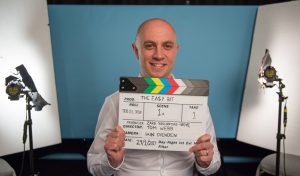
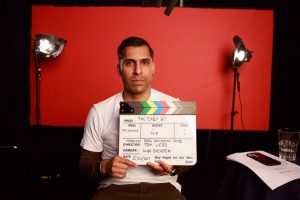
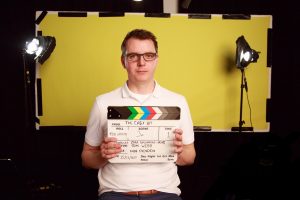
“The process of fertility treatment is very isolating for men and I wanted to reflect that in the film."
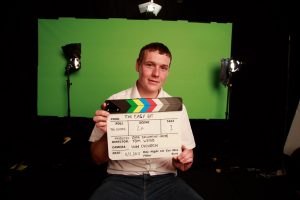
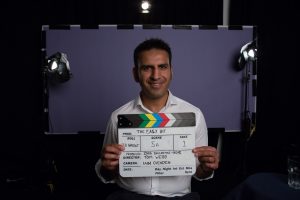
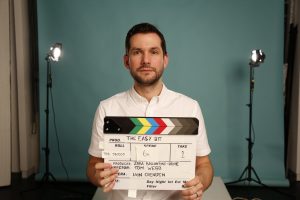
The documentary has a simple minimalist aesthetic which enhances the starkness of the subject matter, was that always the intention?
The process of fertility treatment is very isolating for men and I wanted to reflect that in the film. I wanted to take them away from the home environment and their partners but do it in a visually interesting way. There has been some great research done at Leeds Beckett University that found men don’t really seek professional support but rely more on peer to peer. Unfortunately with something like infertility it is very hard to find other men who are openly talking about it. I felt that by having the guys talk directly into the camera it would feel more like peer to peer support rather than a traditional interview. It also had the added bonus that because the guys were talking to an inanimate camera they didn’t feel the embarrassment or shame that people often feel when talking face to face about personal subjects. I sat at a 90 degree angle to them so they would only make eye contact with me when they were ready.
Each segment is introduced by illustrative animation which really helps affirm the audiences’ understanding, what made animation the natural choice?
I think given the complexity of the processes simple animations became the best way to explain those elements. I originally planned to have the relevant specialists on camera talking through the stages but the more and more I thought about it I felt I needed to concentrate on the men themselves and explain the science in the simplest, least intrusive way possible.
The documentary truly reveals the warts and all honesty and stoicism of all of your contributors, did their openness surprise you?
It truly did. I knew those emotions were in there and how important it was to get them said out loud but I didn’t expect the guy to open up as freely as they did. Several of them came with prepared answers but when the moment came they just spoke from the heart. It made me realise that not only did they want to talk about it, they wanted to be heard and they needed to get it out. After filming the interview with Al-Amin he described the process as the counselling session he didn’t know he needed.
Was it surprising to you the similar experiences the men had encountered?
I expected a degree of similarity but the closeness of emotional experience was startling. Just hearing the guys use similar words and phrases completely unprompted and also the resonance their words had with me made me realise how much men can help each other through this. One of the participants in the film, Gareth, set up a private facebook group called Men’s Fertility Support. It is a private group for men only and within that group men support each other with a shared experience. Hopefully resources like that group and The Easy Bit will help men realise that they are not alone.
Did making the film help you at all?
It has been a very cathartic experience for me. I can honestly say that fertility treatment is one of the most traumatic experiences of my life and just hearing those shared experiences and meeting these extraordinarily brave men has helped me greatly. Through discussions with the guys who I now consider friends I have fundamentally changed how I see myself as a man. I have had discussions with James in particular about masculinity and how you perceive yourself. Perhaps one of the most significant things though was when Al-Amin told me that making the film made him realise that being vulnerable made you stronger. I found that to be a very profound statement especially in the world today where toxic masculinity is rife and caring for your mental health is becoming more and more important.
How important is it that the film not only is used to enlighten those considering IVF or going through the process, but also to aid the medical profession?
I always thought this would work on the peer to peer level but hearing the responses from the medical professionals that have seen it has made me realise that this could impact the fertility world at the clinical level. I hope that they take note and start thinking about how they can change the processes and help support men more. I have always believed that if men have more support that will enable them to help support their partners better given that the women do bear the majority of the medical process.
What are your expectations / hope for the future of the doc?
I hope it helps people, whether that is men going through it, women trying to understand what their partners are going through, medical staff who can improve the support and processes for their patients or just enlighten people who have never considered what impact fertility treatment has on couples. One in six couples in the UK will go through some sort of fertility treatment so the chances are you know someone who is suffering in silence. We are releasing the film initially on Vimeo On Demand and more platforms will follow in the future, so hopefully we will be able to reach the people that need it.
The Easy Bit - Official Trailer
Claire Bueno
Claire Bueno is a film journalist, presenter and interviewer, having moderated BAFTA, Royal Television Society (RTS), Women in Film and Television (WFTV), and Apple Store Q&As and hosted Comic Con panel talks. Claire is the founder of Premiere Scene Magazine and has had the privilege of interviewing esteemed artists including Tom Cruise, George Clooney, Brad Pitt, Sir Anthony Hopkins, Sigourney Weaver, Emily Blunt, Samuel L Jackson, James Cameron and Andy Serkis.
As a media coach Claire works with leading personal publicists, HBO, Netflix, Sky, ITV, Penguin Random House, the BFI, DDA, MacMillan and Premier, offering practical coaching sessions and safe environment for talent to perfect their interview technique before facing the press. She has extensive experience working with emerging and seasoned professionals and where English is not their first language.
Additionally, Claire is the producer of the critically acclaimed feature documentary CLEANIN’ UP THE TOWN: Remembering Ghostbusters and the upcoming TOO HOT TO HANDLE: Remembering Ghostbusters II.